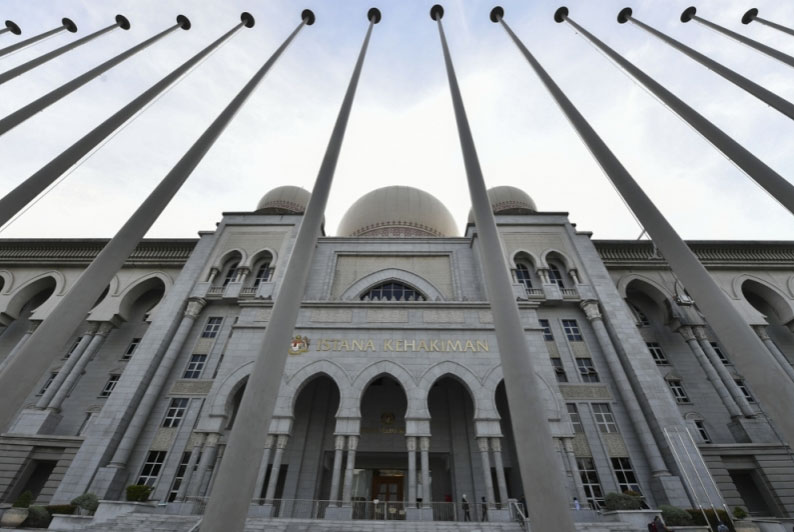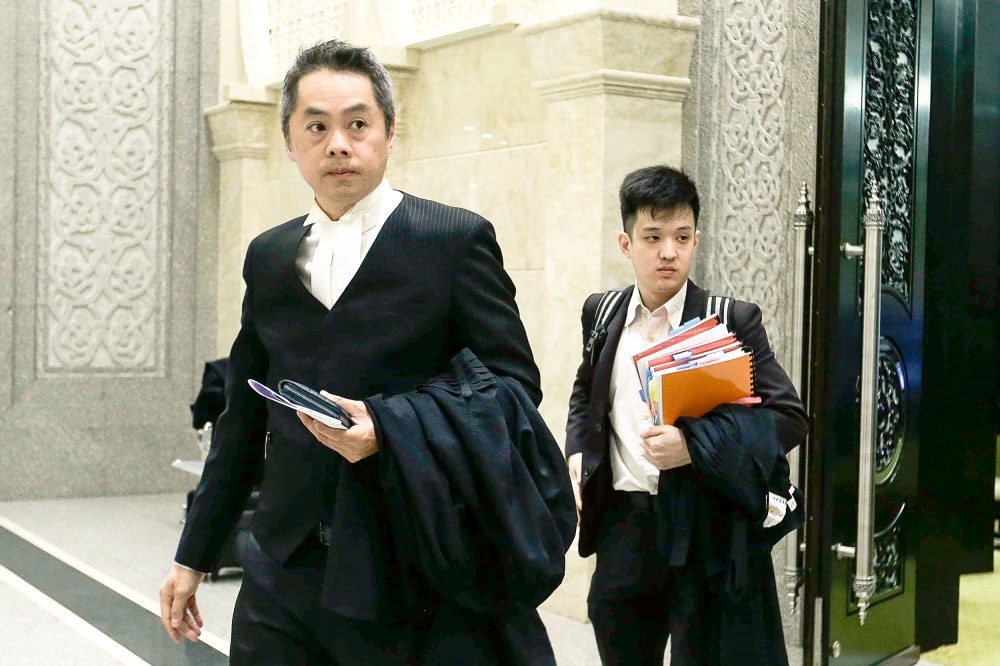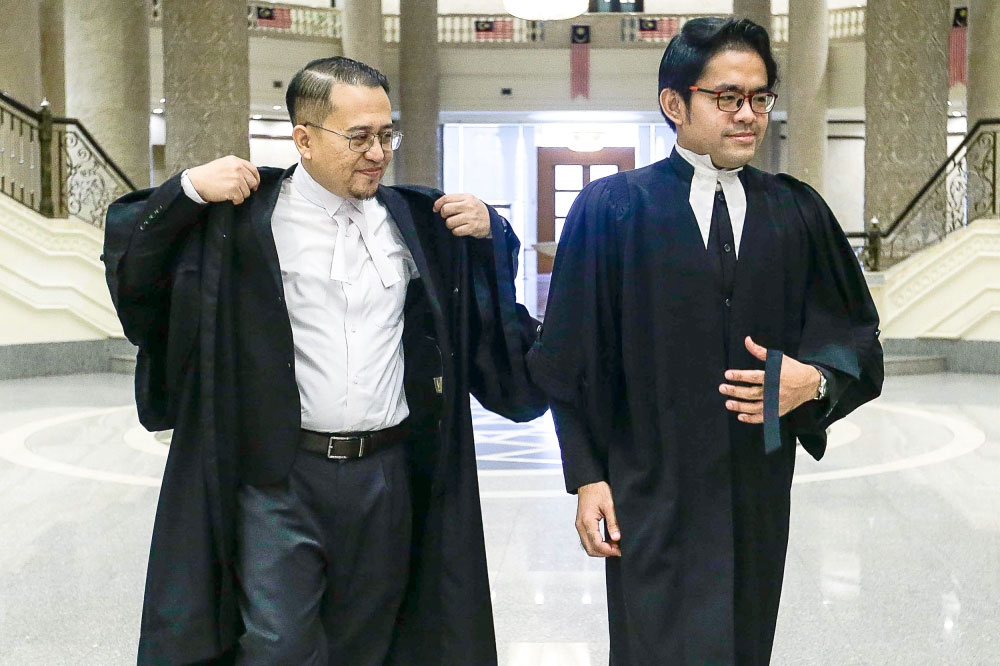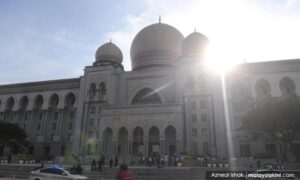By Ida Lim | Malay Mail

The Court of Appeal in a majority decision today effectively restored the Home Minister’s 2020 ban on a book titled Gay is OK!: A Christian Perspective.
Judge Datuk Wong Kian Kheong read out the brief grounds of the majority judgment, saying the High Court judge had erred in law when deciding in February 2022 to quash the ban on the book.
Datuk Azizah Nawawi, who chaired the Court of Appeal panel, said: “I will concur with the findings and decision of Justice Wong. The decision of the High Court is set aside.”
She ordered for costs of RM15,000 to be paid to the home minister and government.
The Court of Appeal panel was also composed of Datuk Gunalan Muniandy, who gave his dissenting judgment which agreed with the High Court that the ban should be quashed.
As his judgment is the minority judgment, the book remains banned in Malaysia.
Gerakbudaya Enterprise had in September 2013 published Ngeo Boon Lin’s book titled Gay is OK!: A Christian Perspective, while the Home Minister had on November 17, 2020 banned the book’s printing, publishing, importation, sale, distribution and possession of the book throughout Malaysia on the grounds that the book is likely to be prejudicial to public order, morality and public interest.
After finding out about the book ban from online news reports on December 18, 2020 following the Home Ministry’s Secretary General’s media statement on the same day, the book publisher and Ngeo via their lawyers sent a letter on February 2, 2021 to request for the Home Minister to revoke the order to ban the book. But the duo received no reply.
On February 17, 2021, Chong Ton Sin trading as Gerakbudaya Enterprise and the book’s author Ngeo filed a lawsuit via a judicial review application to challenge the book ban, naming the two respondents as the Home Minister and the government of Malaysia.
On March 30, 2021, the High Court granted the duo leave for their judicial review, which meant it decided that it would hear the lawsuit.
On February 22, 2022, High Court judge Datuk Noorin Badaruddin ruled in favour of the publisher and writer of the book and quashed the Home Minister’s ban on the book.
On March 17, 2022, the Home Minister and the government of Malaysia filed an appeal against the High Court’s decision. This is the appeal which the Court of Appeal decided on today.

When met at the Putrajaya court complex after the Court of Appeal’s decision was delivered, lawyer Edmund Bon said he will seek instructions from his clients — Chong and Ngeo — on whether to file an appeal to the Federal Court.
Lawyer Michael Cheah also represented the book publisher and the book’s author.
Senior federal counsel Ahmad Hanir Hambaly @ Alwi and federal counsel Mohammad Sallehuddin Md Ali represented the Home Minister and the Malaysian government.
Why the two judges upheld the ban
In deciding to grant the Home Minister and Malaysian government’s appeal, judge Wong noted that the Federal Constitution’s Article 10(2)(a) gives Parliament the power to make laws to restrict the right to freedom of expression and freedom of speech if necessary for reasons such as public order or morality.
Saying that this meant Parliament could enact the Printing Presses and Publications Act’s (PPPA) Section 7(1) — which gives the Home Minister the power to ban books — as law, Wong noted that the book publisher and Ngeo had not challenged the constitutionality of Section 7(1) and that there are no previous court cases which had found Section 7(1) to be unconstitutional.
Wong then said the court has the duty to decide on an objective basis whether the Home Minister is satisfied that the book’s contents is likely to be prejudicial to public order, morality or public interest.
Wong said the question that has to be determined is whether a Home Minister could reasonably arrive at the decision that there is a likelihood of the book being prejudicial to public order, morality and also public interest.
He then listed five errors of law made by the High Court judge, before deciding that the Home Minister and Malaysian government had won the appeal.
Wong said both he and Azizah — who form the majority of the panel in this case — had gone through the book’s contents as a whole and its title Gay is OK!: A Christian Perspective.
“On an objective evaluation, we are satisfied that the book’s entire contents and its title gives a general message that the lifestyle of homosexuality is not prohibited by Christianity,” the judge said, adding that the majority judges are satisfied that a reasonable minister would reach the decision of the likelihood of the book — in light of its overall content and title — being prejudicial to public order, morality and public interest.
The Court of Appeal judge said the “likelihood” of prejudice to public order, morality and public interest still exists although there are no untoward incidents after the book had been published for seven years, making clear this was different from “actual” prejudice.
“Even though there’s no untoward incidents for a period of more than seven years from September 2013 — the date of the publication of the book, until the gazette of the ban, this does not disabuse the existence of likelihood of prejudicial to public order, morality and public interest,” the judge said.
“Failure to find likelihood of prejudice is a clear error of law,” Wong said of the first error of law by the High Court.
Wong also noted the High Court judge having found that the Home Minister had dissected the book’s excerpts in only 42 out of the 226 pages of the book.
But Wong said the Home Minister had actually in a court affidavit said the entire book had been scrutinised and that the minister was merely highlighting certain excerpts.

As for the second error of law, Wong said the High Court had wrongly adopted India’s constitution which only enables “reasonable restrictions” to be imposed on the right to freedom of speech and expression, noting that India’s Constitution is “very different” from Malaysia’s Federal Constitution’s Article 10(2)(a).
As for the third error of law listed by Wong, he said the High Court had cited the Universal Declaration of Human Rights (UDHR) — which includes the right to freedom of expression — when deciding in the book publisher and book writer’s favour.
But Wong said Malaysia’s Parliament had yet to enact any laws to incorporate the UDHR, and that any international declarations cannot override the Federal Constitution’s Article 10(2)(a) — which enables the PPPA to restrict the freedom of expression and with the PPPA’s validity not challenged.
While the High Court had said the book publisher and the book author were not given the right to be heard before the book was banned and that the ban is indefensible, Wong today said that Parliament had deliberately omitted stating the right to be heard in the PPPA’s Section 7(1) — the provision which gives the Home Minister the power to ban books.
In comparison, Wong said the PPPA’s other provisions in Section 7(3) and Section 13B clearly showed Parliament’s intention for a right to be heard. Section 7(3) and Section 13B involves decisions relating to licences and permits.
Wong said the High Court’s decision was wrong in law for that reason, since Section 7(1) does not state the right to be heard.
As for the High Court’s decision that the Home Minister should give reasons for his decision to ban the book, Wong said Section 7 does not require the Home Minister to give reasons for the ban.
“In any event in the prohibition order, the Home Minister gave three reasons, the existence of the likelihood of prejudice to public order, morality or public interest,” the judge said when noting that the reasons were contained in the gazetted Home Minister’s order to ban the book.
He then said the majority of the three-judge panel at the Court of Appeal has decided to allow the government’s appeal against the High Court’s quashing of the ban.
Why the dissenting judge agreed ban should be quashed
Judge Gunalan was of the view that the High Court judge had correctly applied the relevant principles of law, when the latter decided that the Home Minister’s book ban should be quashed due to it being irrational and in breach of natural justice.
He said the High Court judge had looked at the book in its correct context and had not viewed the book in isolation or in a vacuum.
He also said the High Court judge had correctly determined the key facts in this case, including the fact that the book had been published for at least seven years since September 2013 and that there was no evidence of reports that the book had posed threats to public order or morality or went against the public interest, and that there was no evidence of any negative response by the public to the issue of homosexuality in the book.
The other fact that the High Court judge had considered was that the incidents raised by the Home Minister relating to the public’s response to the culture of homosexuality had no connection with the book and the incidents did not disrupt public safety and tranquillity.
He noted the High Court judge had arrived at the finding that the Home Minister had failed to justify the ban on the book and had also failed to show evidence of actual prejudice to public order.
“Where no such evidence is adduced, it follows that the book was in the first place unlikely to be prejudicial to public order,” he said.
Saying that whether a publication is prejudicial to public order and morality would depend on the facts of each case, Gunalan said the High Court judge had not erred in law or facts when deciding to quash the Home Minister’s ban on the book.
Gunalan agreed with and affirmed the High Court’s decision, and said the government’s appeal against the ban’s quashing should be dismissed.



